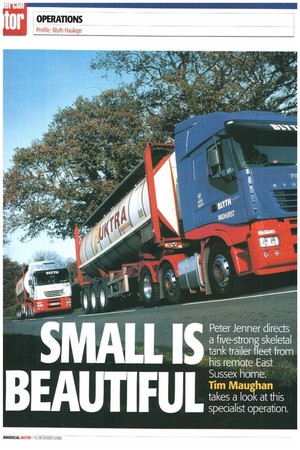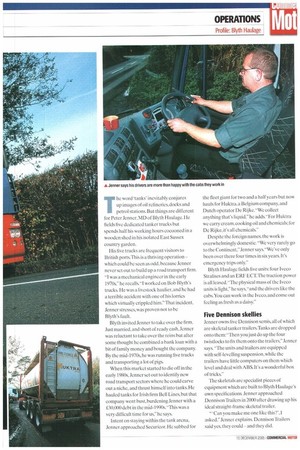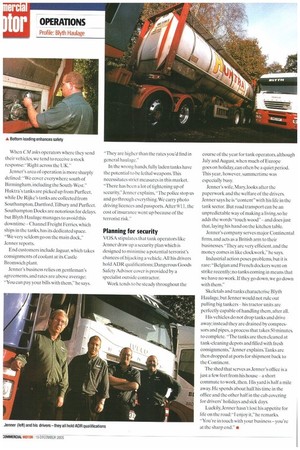Peter Jenner directs
Page 50

Page 51

Page 52

If you've noticed an error in this article please click here to report it so we can fix it.
SMALLS a five-strong skeletal
tank trailer fleet from his remote East his remote East Sussex home.
BEAUTIFUL tTaikmes.maralou5haatnthis
specst operation.
The word 'tanks inevitably conjures up images of oil refineries, docks and petrol stations. But things are different for Peter Jenner, MD of Blyth Haulage. He fields five dedicated tanker trucks but spends half his working hours cocooned in a wooden shed in his isolated East Sussex country garden.
His five trucks are frequent visitors to British ports.This is a thriving operation — which could be seen as odd, because Jenner never set out to build up a road transport firm. -I was a mechanical engineer in the early 1970s." he recalls."I worked on Bob Blyth's trucks. He was a livestock haulier,and he had a terrible accident with one of his lorries which virtually crippled him." That incident, Jenner stresses, was proven not to be Blyth's fault.
Blyth invited Jenner to take over the firm. Just married, and short of ready cash, Jenner was reluctant to take over the reins but after some thought he combined a bank loan with a bit of family money and bought the company. By the mid-1970s, he was running five trucks and transporting a lot of pigs.
When this market started to die off in the early 1980s, Jenner set out to identify new road transport sectors where he could carve out a niche, and thrust himself into tanks. He hauled tanks for Irish firm Bell Lines, hut that company went bust, burdening Jenner with a 00,000 debt in the mid-i990s.This was a very difficult time for us," he says.
Intent on staying within the tank arena, Termer approached Securicor. He subbed for the fleet giant for two and a half years but now hauls for Huktra, a Belgium company, and Dutch operator De Rijke."We collect anything that's liquid," he adds."For Huktra we carry cream, cooking oil and chemicals; for De Rijke.it's all chemicals."
Despite the foreign names, the work is overwhelmingly domestic. "We very rarely go to the Continent," Jenner says. "We've only been over there four times in six years. It's emergency trips only."
Blyth Haulage fields five units: four Iveco Stralises and an ERE ECT.The traction power is all leased."The physical mass of the Iveco units is light," he says,and the drivers like the cabs.You can work in the Iveco, and come out feeling as fresh as a daisy."
Five Dennison skellies
Jenner owns five Dennison semis, all of which are skeletal tanker trailers.Tanks are dropped onto them:"Then you just do up the four twisdocks to fix them onto the trailers," Jenner says. "The units and trailers are equipped with self-levelling suspension, while the trailers have little computers on them which level and deal with ABS. It's a wonderful box of tricks."
The skeletals are specialist pieces of equipment which are built to Blyth Haulage's own specifications. Jenner approached DennisonTrailers in 20(X) after drawing up his ideal straight-frame skeletal trailer.
"'Can you make me one like this?', I asked." Jenner explains. Dennison Trailers said yes. they could—and they did. When CM asks operators where they send their vehicles, we tend to receive a stock response: "Right across the UK."
Jenner's area of operation is more sharply defined: "We cover everywhere south of Birmingham, including the South-West." Huktra's tanks are picked up from Purfleet, while De Rijke's tanks are collected from Southampton, Dartford,Tilbury and Purlleet. Southampton Docks are notorious for delays, but Blyth Haulage manages to avoid this downtime Channel Freight Ferries, which ships in the tanks, has its dedicated space. "We very seldom go on the main dock," Jenner reports.
End customers include Jaguar, which takes consignments of coolant at its Castle Bromwich plant.
Jenner's business relies on gentleman's agreements, and rates are above average: "You can pay your bills with them," he says. -They are higher than the rates you'd find in general haulage."
In the wrong hands, fully laden tanks have the potential to be lethal weapons.This necessitates strict measures in this market. "There has been a lot of tightening up of security," Jenner explains, "The police stop us and go through everything. We carry photo driving licences and passports. After 9/11, the cost of insurance went up because of the terrorist risk."
Planning for security
VOSA stipulates that tank operators like Jenner draw up a security plan which is designed to minimise a potential terrorist's chances of hijacking a vehicle.All his drivers hold ADR qualifications; Dangerous Goods Safety Advisor cover is provided by a specialist outside contractor.
Work tends to be steady throughout the course of the year for tank operators, although July and August, when much of Europe goes on holiday, can often be a quiet period. This year, however, summertime was especially busy.
Jenner's wife, Mary, looks after the paperwork and the welfare of the drivers. Jenner says he is"content" with his life in the tank sector. But road transport can be an unpredictable way of making a living, so he adds the words "touch wood"and does just that, laying his hand on the kitchen table.
Jenner's company serves major Continental firms, and acts as a British arm to their businesses."They are very efficient. and the money comes in like clockwork," he says.
Industrial action poses problems,but it is rare: "Belgian and French dockers went on strike recently;no tanks coming in means that we have no work. If they go down,we go down with them."
Skeletals and tanks characterise Blyth Haulage, but Jenner would not rule out pulling big tankers his tractor units are perfectly capable of handling them, after all.
His vehicles do not drop tanks and drive away: instead they are drained by compressors and pipes, a process that takes 50 minutes. to complete. "The tanks are then cleaned at tank-cleaning depots and filled with fresh consignments," Jenner explains.Tanks arc then dropped at ports for shipment back to the Continent.
The shed that serves as Jenner's office is a just a few feet from his house a short commute to work, then. His yard is half a mile away. He spends about half his time in the office and the other half in the cab covering for drivers' holidays and sick days.
Luckily,Jenner hasn't lost his appetite for life on the road: "I enjoy it," he remarks. -You're in touch with your business-you're at the sharp end." •






















































































































































































